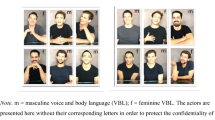Abstract
In this paper, we focus on gendered themes promulgated in three books written in diary cartoon form. Although written for different audiences, each of these books constructs gender norms in similar ways. They promote heteronormative gender roles for boys and girls by endorsing traditional femininities and hegemonic masculinities through the following themes: popularity, mean girls/bullying, self-concept and self-esteem, friendship, and adult naïveté. First, we discuss the ways in which gender is implicated in children’s literature. Then, we describe and analyze the diary cartoon books, contrasting and comparing those with girl protagonists and that with a boy protagonist. Finally, we explore the gendered implications in the books’ themes, concluding that girls and boys are represented in different manners that reinforce gender essentialism and heteronormativity.
Similar content being viewed by others
Notes
All emphases in quotations are in the original texts.
References
Albers, P. (2008). Theorizing Visual Representation in Children’s Literature. Children’s Literature in Education, 40(2), 163–200.
Baker-Sperry, L. (2007). The Production of Meaning Through Peer Interaction: Children and Walt Disney’s Cinderella. Sex Roles, 56(11–12), 717–727.
Baker-Sperry, L., & Grauerholz, L. (2003). The Pervasiveness and Persistence of the Feminine Beauty Ideal in Children’s Fairy Tales. Gender & Society, 15(5), 711–726.
Clark, R., & Fink, H. (2004). Picture This: A Multicultural Feminist Analysis of Picture Books for Children. Youth & Society, 36(1), 102–125.
Connell, R.W. (1995). Masculinities. Berkeley: University of California Press.
Connell, R.W., & Messerschmidt, J. (2005). Hegemonic Masculinity: Rethinking the Concept. Gender & Society, 19(6), 829–859.
Gonick, M. (2004). The Mean Girl Crisis: Problematizing Representations of Girls’ Friendships. Feminism & Psychology, 14(3), 395–400.
Hubler, A.E. (2000). Beyond the Image: Adolescent Girls, Reading, and Social Reality. NWSA Journal, 12(1), 84–99.
Hughes, J., & King, A.E. (2010). Dual Pathways to Expression and Understanding: Canadian Coming-of-Age Graphic Novels. Children’s Literature in Education, 41(1), 64–84.
Jackson, S. (2007). “She Might not Have the Right Tools and He Does”: Children’s Sense-Making of Gender, Work and Abilities in Early School Readers. Gender and Education, 19(1), 61–77.
Lee, J.F.K., & Collins, P. (2009). Australian English-Language Textbooks: The Gender Issues. Gender and Education, 21(4), 353–370.
Marshall, E. (2004). Stripping for the Wolf: Rethinking Representations of Gender in Children’s Literature. Reading Research Quarterly, 39(3), 256–270.
Marshall, E., & Sensoy, O. (2009). The same Old Hocus-Pocus: Pedagogies of Gender and Sexuality in Shrek 2. Discourse: Studies in the Cultural Politics of Education, 30(2), 151–164.
McInally, K. (2008). Who Wears the Pants? The (Multi)Cultural Politics of The Sisterhood of the Traveling Pants. Children’s Literature in Education, 39, 187–200.
Myers, K., & Raymond, L. (2010). Elementary School Girls and Heteronormativity: The Girl Project. Gender & Society, 24(2), 167–188.
O’Neil, K. (2010). Once Upon Today: Teaching for Social Justice with Postmodern Picturebooks. Children’s Literature in Education, 41(1), 40–51.
Ringrose, J. (2006). A New Universal Mean Girl: Examining the Discursive Construction and Social Regulation of a New Feminine Pathology. Feminism & Psychology, 16(4), 405–424.
Routh, C. (2001). “Man for the Sword and for the Needle She”: Illustrations of Wendy’s Role in J.M. Barrie’s Peter and Wendy. Children’s Literature in Education, 32(1), 57–75.
Taber, N., & Woloshyn, V. (in press). Exceptionalities, gender, and power: Issues of inclusion in children’s award-winning literature. Gender and Education.
Trousdale, A.M., & McMillan, S. (2003). “Cinderella was a Wuss”: A Young Girl’s Responses to Feminist and Patriarchal Folktales. Children’s Literature in Education, 34(1), 1–28.
Wannamaker, A. (2006). Reading in the Gaps and Lacks: (De)constructing Masculinity in Louis Sachar’s Holes. Children’s Literature in Education, 37(1), 15–33.
Zipes, J.D. (1999). When Dreams Come True: Classical Fairy Tales and Their Traditions. London: Routledge.
Zipes, J.D. (2002). Sticks and Stones: The Troublesome Success of Children’s Literature from Slovenly Peter to Harry Potter. New York: Routledge.
Diaries
Benton, J. (2004). Dear Dumb Diary: Let’s Pretend This Never Happened. New York: Scholastic Paperbacks.
Kinney, J. (2007). Diary of a Wimpy Kid: Greg Heffley’s Journal. New York: Abrams.
Russell, R.R. (2009). Dork Diaries: Tales from a NOT-SO- Fabulous Life. New York: Aladdin.
Author information
Authors and Affiliations
Corresponding author
Additional information
Nancy Taber is an Assistant Professor in the Faculty of Education at Brock University. Her research interests include sociocultural issues in children’s fiction; learning masculinities and femininities in everyday life; and, gender in war/militaries/militarism. Vera Woloshyn is a Professor in the Faculty of Education at Brock University. Her research interests include ableism in children’s fiction; developing and implementing effective literacy and learning programs for children and adults; and, working with students who experience learning difficulties.
Rights and permissions
About this article
Cite this article
Taber, N., Woloshyn, V. Dumb Dorky Girls and Wimpy Boys: Gendered Themes in Diary Cartoon Novels. Child Lit Educ 42, 226–242 (2011). https://doi.org/10.1007/s10583-011-9131-6
Published:
Issue Date:
DOI: https://doi.org/10.1007/s10583-011-9131-6




